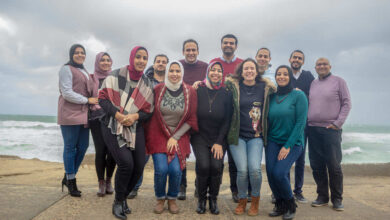Is There a Real Startup Opportunity in Egypt?

This is a question everyone answers to their own bias. The fault doesn’t lie in the question, but in whom it is usually directed to: People with skin in the game.
Therefore, getting an objective answer from them is only fabric of imagination. Sadly, this can be as good as it gets; there aren’t really other people whom you can ask this question and expect an impartial response. Here’s a subset of those usually tasked with tackling said question:
Entrepreneurs in the scene. They can have working companies making them profit of sorts and getting them some validation (personal, social, prestige, money). They would lean naturally into seeing it through what they’ve achieved so far. If things aren’t really going well for them, their answers would possibly be relatively different.
Startup Accelerators usually have the better end of their investment deals and they need to keep filling their pipelines with new infant startups, in order to buy the most cost-effective equity possible — in bulk. So, it’s only good business practice for them to promote the heck out of the startup opportunity in Egypt.
Grants and their management staff are appraised by the number of startups/initiatives/events/activities they have managed to “make happen”. So, the quantity of their work outweighs its quality by default, and their main objective becomes churning out as many startups as they can, or else.
Service providers to startups and their surroundings have interests harmonious with those of accelerators and grants (lawyers, accountants, designers, video producers, printing houses, etc.). Hence, they must preach to the rapid creation of “large” numbers of startups typically requiring their services. They are basically looking after their business and sustaining their own livelihood.
Investors working in high-risk-high-reward markets always have a different risk tolerance and appetite than the average man. Nonetheless, they do express the investment opinions relatively positively while discarding their differently calibrated risk sensors. Understandably, high-risk-high-reward markets usually offer relatively cheap investments, especially if they sourced their money in USD/EUR and invest in the local currency. So, it must be expected from investors to speak positively about the markets they invest in.
Perhaps it is becoming obvious now why the startup opportunity is being marketed as the road to salvation in Egypt. More so, when you observe who is pushing this message, huh?
Although the above phrasing might seem a bit patronizing, I do clearly confirm, that I’m not of divine, infallible and undeniable logic or wisdom. I do in fact revere the above groups’ respective points of view. Putting your “money” where your mouth is to back your position and grow your “success” deserves major respect, regardless.
Having said that, I’ve had skin in this game as a founder of a growing tech company operating in the Audiobooks space for a decent while; I still do to some extent. It has, however, taken a relative backseat to where I am now. Be that as it may, I will try to put together an objective point of view, while acknowledging and embracing my biases. After all, like it or not, you are your biases. Period. Otherwise stated is an act of lunacy in my book.
So, back to the question: Is there a REAL startup opportunity in Egypt?
My answer is: A Conditional YES.
Yes, because believe it or not, there are people who are actually making it work, albeit ranging from hardly to successfully.
I know first hand, that it is exasperating, herculean and every breath along the way involves a lot of insurmountably insignificant and infuriating trifles.
I know first hand, that truckloads of manure — both metaphorically bovine and miscellaneously literal — are constantly catapulted directly at industrial fans strangling you and everyone involved, which makes fire-fighting THE national startup sport.
I know first hand, that talents are scarce and Gen Y are running for their lives from Egypt to any place that would harbor them under any conditions, instead of fueling the growth of local startups. Hiring in general be it for skilled or unskilled labor of any shape or form is a never-ending-zombie-apocalyptic-vampire-feeding-frenzy-nightmare in Egypt.
But, fact of the matter is, there are brave souls who are actually making it happen — successfully and profitably. This is evidence we cannot ignore.
Obviously, a lot rides on the team, their capabilities, their unfair advantage, their business idea/model, its conceptualization, their financing and execution. I’m not discussing those things here. I’m more inclined to observe the external factors that can catalyze or hinder a company’s existence and growth in Egypt. Factors that relate to early on decisions in your choice of startup, vertical and proposition.
In the end, this is my attempt to highlight the choices that can increase your prospects of success, and how said choices can affect you and your company.
I decided to turn this into a series detailing each condition where a startup opportunity exists in Egypt, because as I started writing, I found one article won’t be enough, without exceeding 10,000 words.
As a warm-up and to set the tone, here are some general pointers before the deep dive:
1- Egypt is a land of pyramids, not rocket-ships. The market likes what it knows and shies away from what seems weird or not “validated”. Validation usually means: already successfully profitable, reached cash-flow positive, has large traction and/or brand recognition; also, when someone in the market has already had success in the space while there is seemingly some room in the market for new entrants. Case in point: Uber & Careem (“successful” in the space), then Ousta, then Pink taxi, then whatever (new entrants). The on-demand-chauffeur market can still encompass more for now. A company at any stage before that is very rarely considered validated. If you are going to start a company, think of validating it quickly by generating cash and profits early enough through solid unit economics. This is a relatively sure-fire way to succeed.
2- Innovation is a stranger to the Egyptian market, one that faces sever racist push back rather than skeptical welcoming. I’m from the innovation sphere and it took us blood, sweat and tears to push iqraaly to the market, and it is still an uphill battle, even after product-market-fit. Just keep this in the back of your head. Innovating a new product isn’t necessarily the way to go in Egypt, because it requires serious funding, risk tolerance, patience and perseverance. It is a fully fledged marathon, and if you manage to push through the end game, you face a very happy ending. People seldom finish though. Very seldom. I’m not saying that you should not innovate. NO. I’m saying that if you are looking to start a company in Egypt, offering an innovative value proposition isn’t always the sure-fire way to go; in fact, it is the opposite. If you want to innovate, make sure your innovation solves a very real pain for your market, and expect it to take a lot of time, effort and push to get the traction you need.
3- Optimization is a merchandise rarely appreciated in the Egyptian market, unless it provides drastic sales/profit/revenue increase to its users. Optimization tools/services reducing costs and increasing efficiency are fine and dandy, but unless the client’s costs are staggering and eating up profits like piranhas on a piece of meat, said offering is always considered an unaffordable luxury. Case in point: how many times is an Egyptian street dug up and repaved after it was asphalted for reasons that could have been avoided if efficiency was a virtue? Yes… I know; very efficient and well optimized. It is a common work culture by the way even in the private sector, not just within the Egyptian bureaucracy that exists to mess with you. We Egyptians, generally work only to get paid and maintain our payments, not to actually achieve something. So, there is hardly room for optimization or efficiency increase here. If you want to offer some value proposition based on optimization, tie it directly to massively increasing the clients’ revenues and help them reach their sales targets, rather than cost reduction or efficiency improvement. Bottom line, optimize to double or triple sales and revenue, not to save time or money.
4- The raw benefits of using technology and programmatic processes are NOT blatantly obvious whatsoever in most industries in Egypt. Most businesses and people are more-or-less “happy” and/or comfortable with doing things as they always have. Using a Japanese ass-cleaning-system controlled by an app to clean one’s behind instead of regular switch-on-switch-off Shattafa and toilet-paper won’t really cut it for the Egyptian market. Unless technology puts real money in the users’ pocket, it becomes a nice-to-have, and no business is built on being a nice-to-have. This is magnified in Egypt where disposable income is mostly a figment of imagination for people and businesses. Remember: experimentation to reality is like Egyptian scientific research’s to “Higher Education” — a slide at the end of a shitty presentation targeting only self-preservation. Again, if you offer technology that is very cheap to the client and can drastically increase their revenue, you might have a shot at a business.
5- Egypt is a wasteland of infrastructure and a zombie-land of value chains. The existence of EVERY single business in the world relies massively on its enveloping value chains and underlying infrastructure. So, starting a business in Egypt has to respect the value chain it is in. The Management team needs to make absolute sure they can navigate and orchestrate their business around the crap they will find in their respective value chains. Because no matter how innovative your idea is, or how strong you build your core team, if it is missing the value chain, and you are not planning to go full-stack (I’ll get to that further on up the road), you are definitely and absolutely screwed. And in case I’ve said “value chains” too much, once more: value chain. Look it up if you have to. I’ll give the example I’m most familiar with: Digital Content publishing and Advertising. The value chain in the real world consists of: the Publisher — who creates the content, the publishers’ agency — who buys the ad rights to said publisher’s content, the media buyer — who buys ads on behalf of brands because he has ongoing deals with publishers’ agencies and buys from them in bulk, the media planner — who puts together a media plan for the brand, i.e. which ad slots to buy where, in order to achieve their sales targets. This value chain is extremely weak in Egypt and it is very, very hard for new publishers to enter the scene. Smaller digital publishers who made it had to navigate through this messy value chain, and sometimes compensating for its gaps — e.g. selling to brands and media buyers directly. I will write a separate piece on it to give it adequate elaboration, but you get the gist.
6- Marketplaces and multi-sided business models are a nice dream الحلم الجميل. They are cool to own once they are big and some snowballing is taking place. But building them up from scratch is extremely tricky and needs real strategy, skill, implementation and resources to overcome the chicken and egg problem. In case you are wondering, which chicken and egg problem I’m talking about, here it is in a nutshell: In a market place, you need to attract buyers and sellers to your platform. But no buyers will come to your marketplace unless a decent variety of sellers/products/services is sold. On the other hand, no seller will give you their attention unless you have decent traffic to make selling on your platform/product worth their time. More often than not, it really costs an arm and a leg to build such a platform and ramp up its usage, because you will have to pay for having either the chicken or the egg. OLX (back then it was dubizzle) burned through insane marketing budgets to generate listings upon launch to get over the threshold where it becomes a go to place for buyers of 2nd hand merchandise. However, if you manage to grow one, you are basically building a gold mine. But Rome wasn’t built in a day. If you are going for a platform and/or marketplace, you need to account for a massive marketing and content/sellers acquisition budget in your plans. You will need to overcome the chicken and egg problem, and it is a problem that you will most probably need to throw money at. I’m not saying it doesn’t work. It does and it has. And it can work without throwing money at it if you have an unfair advantage or some partnership that enables you to overcome it. But, it is not as easy as it is presented to the public. In fact, way, way tougher. I will cover this in greater details in a separate piece later.
Those were some initial pointers on the conditions to start a company in Egypt. Conditions you can actually influence by making the right choices.
Here is my advice: to increase your chances of success, keep the above in the back of your mind despite what optimistic BS you hear in the startup events. The above content and what shall follow in this series is in fact tried and tested by me and by my direct acquaintances. But it is your choice what to do about it.
The next stop is one of the interesting verticals, where starting a company just might make sense in Egypt: The Services industry.
Acknowledgements:
- Thanks to Mohamed Hamada for your valuable and detailed feedback.
Thanks Cornelius James O’donnell and Moataz Kotb for continuing the discussion and adding your two cents. - Thanks Ameer Sherif and Mai Medhat for being surprised in my thoughts not being as dark as you expected, and thanks for sharing your two cents.
- Thanks Mustafa Raslan for your kind words; they are really humbling.
- Thanks Ahmed Soliman for your solid gratitude.
- Thanks to my dear friend Ayman Naguib for your continued discussion of the shared thoughts.
- Thanks Eman Hylooz for your offline comments. Looking forward to seeing them in details here on medium. Update: Thanks for your invaluable comments and discussion here on medium.
- Thanks Ahman Rashed for your comments. I will try to make the language easier. Not sure I can though. Also, thanks for directing my attention towards Egypt requiring more focus on non-tech companies.
- Thanks Omar Maher for your big set of comments. I have gone through most of them, as it is a bit tougher to go through audio comments. I will let you know of my feedback.
- Thanks Tarek Fahim for your pointers on marketplaces. Noted and edited.
- Thanks Dalia Al-Said for your comments and encouragement as well.
- Thanks Abdulrahman Khedr for your interesting discussion on the subject.
- Thanks Mai El Zeiny for your nice pointer and discussion as well.
- Thanks to Ahmed El Alfi for his detailed comments and discussion of the article’s premise.
Whoever else will give me valuable feedback and/or sincere public thanks, I will acknowledge them here. I keep updating this section.
This article first appeared on Medium and the author, Abdelrahman Wahba has authorized us to use it.



